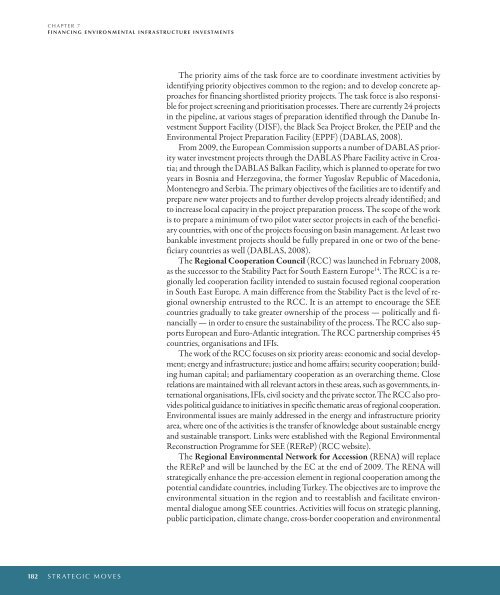Strategic Moves - Regional Environmental Center for Central and ...
Strategic Moves - Regional Environmental Center for Central and ...
Strategic Moves - Regional Environmental Center for Central and ...
You also want an ePaper? Increase the reach of your titles
YUMPU automatically turns print PDFs into web optimized ePapers that Google loves.
182<br />
C H A P T E R 7<br />
F I N A N C I N G E N V I R O N M E N TA L I N F R A S T R U C T U R E I N V E S T M E N T S<br />
S T R AT E G I C M O V E S<br />
The priority aims of the task <strong>for</strong>ce are to coordinate investment activities by<br />
identifying priority objectives common to the region; <strong>and</strong> to develop concrete approaches<br />
<strong>for</strong> financing shortlisted priority projects. The task <strong>for</strong>ce is also responsible<br />
<strong>for</strong> project screening <strong>and</strong> prioritisation processes. There are currently 24 projects<br />
in the pipeline, at various stages of preparation identified through the Danube Investment<br />
Support Facility (DISF), the Black Sea Project Broker, the PEIP <strong>and</strong> the<br />
<strong>Environmental</strong> Project Preparation Facility (EPPF) (DABLAS, 2008).<br />
From 2009, the European Commission supports a number of DABLAS priority<br />
water investment projects through the DABLAS Phare Facility active in Croatia;<br />
<strong>and</strong> through the DABLAS Balkan Facility, which is planned to operate <strong>for</strong> two<br />
years in Bosnia <strong>and</strong> Herzegovina, the <strong>for</strong>mer Yugoslav Republic of Macedonia,<br />
Montenegro <strong>and</strong> Serbia. The primary objectives of the facilities are to identify <strong>and</strong><br />
prepare new water projects <strong>and</strong> to further develop projects already identified; <strong>and</strong><br />
to increase local capacity in the project preparation process. The scope of the work<br />
is to prepare a minimum of two pilot water sector projects in each of the beneficiary<br />
countries, with one of the projects focusing on basin management. At least two<br />
bankable investment projects should be fully prepared in one or two of the beneficiary<br />
countries as well (DABLAS, 2008).<br />
The <strong>Regional</strong> Cooperation Council (RCC) was launched in February 2008,<br />
as the successor to the Stability Pact <strong>for</strong> South Eastern Europe 14 . The RCC is a regionally<br />
led cooperation facility intended to sustain focused regional cooperation<br />
in South East Europe. A main difference from the Stability Pact is the level of regional<br />
ownership entrusted to the RCC. It is an attempt to encourage the SEE<br />
countries gradually to take greater ownership of the process — politically <strong>and</strong> financially<br />
— in order to ensure the sustainability of the process. The RCC also supports<br />
European <strong>and</strong> Euro-Atlantic integration. The RCC partnership comprises 45<br />
countries, organisations <strong>and</strong> IFIs.<br />
The work of the RCC focuses on six priority areas: economic <strong>and</strong> social development;<br />
energy <strong>and</strong> infrastructure; justice <strong>and</strong> home affairs; security cooperation; building<br />
human capital; <strong>and</strong> parliamentary cooperation as an overarching theme. Close<br />
relations are maintained with all relevant actors in these areas, such as governments, international<br />
organisations, IFIs, civil society <strong>and</strong> the private sector.The RCC also provides<br />
political guidance to initiatives in specific thematic areas of regional cooperation.<br />
<strong>Environmental</strong> issues are mainly addressed in the energy <strong>and</strong> infrastructure priority<br />
area, where one of the activities is the transfer of knowledge about sustainable energy<br />
<strong>and</strong> sustainable transport. Links were established with the <strong>Regional</strong> <strong>Environmental</strong><br />
Reconstruction Programme <strong>for</strong> SEE (REReP) (RCC website).<br />
The <strong>Regional</strong> <strong>Environmental</strong> Network <strong>for</strong> Accession (RENA) will replace<br />
the REReP <strong>and</strong> will be launched by the EC at the end of 2009. The RENA will<br />
strategically enhance the pre-accession element in regional cooperation among the<br />
potential c<strong>and</strong>idate countries, including Turkey. The objectives are to improve the<br />
environmental situation in the region <strong>and</strong> to reestablish <strong>and</strong> facilitate environmental<br />
dialogue among SEE countries. Activities will focus on strategic planning,<br />
public participation, climate change, cross-border cooperation <strong>and</strong> environmental






